| Srl | Item |
| 1 |
ID:
113503
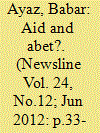

|
|
|
| 2 |
ID:
126371
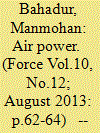

|
|
|
|
|
| Publication |
2012.
|
| Summary/Abstract |
The Indian Air Force (IAF) is into its eighth decade and as it closes in on its centenary, a mere two decades away, many a treatise has been propounded on the challenges ahead for the youngest armed service of independent India. What started as a mere flight of Wapitis at Drigh Road, Karachi, has grown into a potent power projection arm of the state.
The IAF derives its fortitude from its motto, Nabha Sparsham Deeptam (Touch the Sky with Glory). But there is perhaps a limitation in the coining of this motto as there is a hint of conclusiveness in the envelope of operation of Air Power. A more intuitive and farsighted approach may well have resulted in its coining to include space, the final frontier. But is space the final frontier? One better be careful lest a scribe writing about the IAF a few decades from now also questions this writer's perceptive ability!
Limiting the horizon to a manageable timeframe makes the future 'realistically' transparent. So, considering a timespan of 20 years, when the IAF turns 100, let's evaluate how the anticipated threats and challenges are to be addressed based on the IAF doctrine.
|
|
|
|
|
|
|
|
|
|
|
|
|
|
|
|
| 3 |
ID:
133411
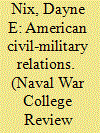

|
|
|
|
|
| Publication |
2012.
|
| Summary/Abstract |
Samuel P. Huntington died in December 2008, but this Harvard academic continues to have a significant impact on the conduct and state of American civil-military relations. Mackubin Owens's recent US Civil-Military Relations after 9/11: Renegotiating the Civil-Military Bargain and Suzanne Nielsen and Don M. Snider's 2009 edited work American Civil-Military Relations: The Soldier and the State in a New Era both challenge and contextualize Huntington's work for contemporary theorists and practitioners of civil-military relations. This is indeed a worthwhile effort, as America's civil-military relations have received much "airtime" over the past few years. General Stanley McChrystal's seeming challenge to the political leadership over proposed Afghanistan troop levels, Lieutenant Colonel Andrew Milburn's Joint Force Quarterly article challenging traditional conceptions of civilian control, and Bob Woodward's revelations in Obama's War regarding the 2009 tensions between the Pentagon and the administration over Afghanistan strategy highlight the relationship between the military and our civilian leaders while raising the issue of the military's participation in political discourse.
|
|
|
|
|
|
|
|
|
|
|
|
|
|
|
|
| 4 |
ID:
131984
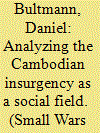

|
|
|
|
|
| Publication |
2014.
|
| Summary/Abstract |
This article investigates power practices in the Cambodian insurgency after 1979 as being part of a social field. There are various types of power practice being exercised by commanders aiming at making soldiers disciplined inside the insurgency. The hypothesis explaining these variations being proposed here is that the type of power being exercised depends on the habitus of the respective commander. Power practices are shaped by the incorporated classificatory discourse of commanders on good soldierhood and leadership. Thereby, armed groups can be analyzed as a social field in which practices are always relational and part of symbolic struggles between different commanders.
|
|
|
|
|
|
|
|
|
|
|
|
|
|
|
|
| 5 |
ID:
118802
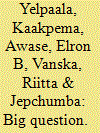

|
|
|
|
|
| Publication |
2012.
|
| Summary/Abstract |
Technology is the touchstone of development. Acquiring advanced technologies helped boot-strap China and India out of the economic doldrums in a generation. Across Europe and North America, it's maintained the West's economic, social, cultural, political, and military leadership. Yet for decades, Africa was perceived as having been left behind. Now, as mobile technology spreads across Africa, innovative ways of using technology are transforming almost every sector of life. We have asked our panel of global experts to weigh in on what role technology should play in the development of Africa.
|
|
|
|
|
|
|
|
|
|
|
|
|
|
|
|
| 6 |
ID:
133800
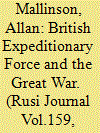

|
|
|
|
|
| Publication |
2014.
|
| Summary/Abstract |
A counterfactual account of what Britain's leaders could have done prior to the Great War to prepare the country more effectively for fighting a European land war
The decision-making of Britain's political and military leaders in August 1914 has been subject to much scrutiny in the intervening century. Allan Mallinson argues vehemently that the wrong decisions were taken in the years preceding the outbreak of the conflict, and presents a counterfactual of what Britain's experience could have been had conscription been introduced or sounder preparations for a land engagement been made before 1914.
|
|
|
|
|
|
|
|
|
|
|
|
|
|
|
|
| 7 |
ID:
015227
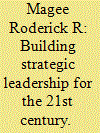

|
|
|
|
|
| Publication |
Feb 1993.
|
| Description |
36-44
|
|
|
|
|
|
|
|
|
|
|
|
|
|
|
|
| 8 |
ID:
019849
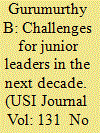

|
|
|
|
|
| Publication |
April-June 2001.
|
| Description |
241-256
|
|
|
|
|
|
|
|
|
|
|
|
|
|
|
|
| 9 |
ID:
077719
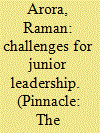

|
|
|
| 10 |
ID:
009727
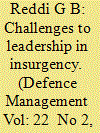

|
|
|
|
|
| Publication |
Oct 1995.
|
| Description |
33-41
|
|
|
|
|
|
|
|
|
|
|
|
|
|
|
|
| 11 |
ID:
019718
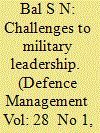

|
|
|
|
|
| Publication |
May 2001.
|
| Description |
1-9
|
|
|
|
|
|
|
|
|
|
|
|
|
|
|
|
| 12 |
ID:
064916
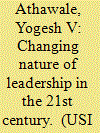

|
|
|
|
|
| Publication |
Apr-Jun 2005.
|
|
|
|
|
|
|
|
|
|
|
|
|
|
|
|
| 13 |
ID:
114839
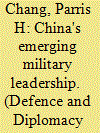

|
|
|
| 14 |
ID:
126737
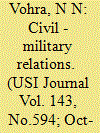

|
|
|
| 15 |
ID:
106388
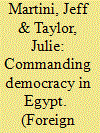

|
|
|
|
|
| Publication |
2011.
|
| Summary/Abstract |
Despite its vows to speed Egypt toward elections, the country's military leadership is actually ambivalent about democracy. Above all, Egypt's generals want to preserve stability and protect their privileges. But having unleashed democracy, the military may not be able to control it -- especially if Washington keeps up the pressure to move forward.
|
|
|
|
|
|
|
|
|
|
|
|
|
|
|
|
| 16 |
ID:
006930
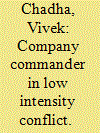

|
|
|
|
|
| Publication |
New Delhi, Lancer Publishers, 1997.
|
| Description |
231p.
|
| Standard Number |
187829299
|
|
|
|
|
|
|
|
|
|
|
|
Copies: C:1/I:0,R:0,Q:0
Circulation
| Accession# | Call# | Current Location | Status | Policy | Location |
| 038703 | 355.0218/CHA 038703 | Main | On Shelf | General | |
|
|
|
|
| 17 |
ID:
081058
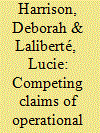

|
|
|
|
|
| Publication |
2008.
|
| Summary/Abstract |
This article explores the tension between military objectives and the "democracy value" cherished by Western civilian societies, using the situations of injured military members and the living conditions of civilian spouses; in particular, the responses of the Canadian Forces to members' posttraumatic stress disorder, and to spouses who are victims of domestic violence. The authors show how these responses currently privilege military objectives over the democracy value to an extent that is incompatible with the human rights of civilians or military members. They conclude by discussing how military leadership training could be modified to produce an altered balance between the two value systems
|
|
|
|
|
|
|
|
|
|
|
|
|
|
|
|
| 18 |
ID:
064465
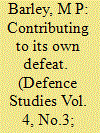

|
|
|
| 19 |
ID:
130699
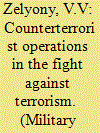

|
|
|
|
|
| Publication |
2014.
|
| Summary/Abstract |
With reference to special measures taken by the Israeli authorities, the author examines the nature and specific aspects of counterterrorist operations, suggest his own definition and develops a classification of the fight against terrorism.
|
|
|
|
|
|
|
|
|
|
|
|
|
|
|
|
| 20 |
ID:
130089
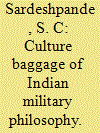

|
|
|
|
|
| Publication |
2014.
|
| Summary/Abstract |
The Gandhi an philosophy at ahimsa has attested the Indian attitude towards war and use of force. Nehruvian distrust ot India's armed forces and military leadership has coloured the dispensation national defence and the armed forces get. Historical, intellectual, cultural and administrative neglect oi the need for national defence cause deep concern. The people and their elected representatives have indifference to and inadequate knowledge of defence matters, their imperatives, demands and consequences. Bhutto said, "We will eat grass, but produce an atomic weapon". This awareness and determination does not sink in our Indian thought. Indian attitude resonates to its cultural ethos - waiting tor something to happen, somewhere, somehow, some time and somebody to take care, without designing things.
|
|
|
|
|
|
|
|
|
|
|
|
|
|
|
|